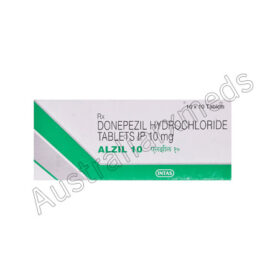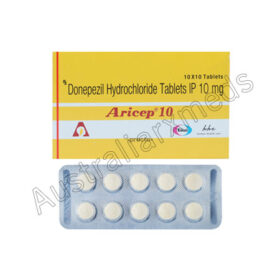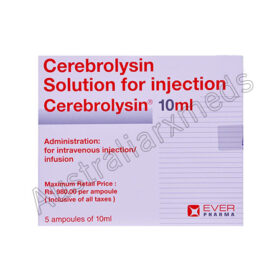
Alzheimer's Disease
Showing 1–8 of 28 resultsAlzheimer’s disease is a type of nerve disorder, which in simple terms means the death of nerve cells. Because of this issue, patients with the disorder suffer from cognitive decline as well.
As patients suffer from the death of brain cells, it can lead to dementia or permanent loss of memory. As per data from the National Institute of Health, close to 7 million people in the US alone have the issue.
It begins to occur when the beta amyloid cells in the brain start to form plaques inside.
Factors Contributing to Alzheimer’s Disease
Even after lots of research from the FDA and other prestigious institutes around the world, scientists have not been able to get a clear idea of why Alzheimer’s disease occurs in people.
➨ However, scientists have been able to identify common triggers that may cause the disorder, such as:
- Aging
- Family history of having the disorder.
- Having genetic issues
- Trauma to the brain
- Major brain surgeries
- Exposure to certain toxic substances, which can include.
- Heavy metals,
- Pesticides
- Other industrial chemicals
Symptoms Of Alzheimer’s Disease
- Asking the same questions again and again
- Forgetting things
- Unable to remember the locality.
- Bad decision-making
- Unable to plan things.
- Not able to identify personal things or even close people, such as family members and friends.
- Stuttering in speech
- Sudden changes in emotions such as agitation, frustration, a burst of anger
Visit a doctor in case any of these issues occur for further diagnosis.
Prevention
- Eating a healthy diet, a simple one that contains fresh fruits, veggies, lean meat, and sea fish.
- Increase intake of omega-3 chain fatty acids.
Medicines Commonly Prescribed
➨ Here is a list of some common medicines that the doctors may tell you to use after diagnosing Alzheimer’s disease:
- Aricept
- Exelon
- Memantine
- Namzaric
Diagnosis of Alzheimer’s Disease
As per FDA guidelines, there is no specific diagnostic test for Alzheimer’s disease. When you go to the doctors, they may conduct a few particular brain tests, imaging tests, and check your symptoms to confirm the issue.
➨ Here is what the doctors are going to do:
- Check your reflexes.
- Check your ability to remember things.
- Check your problem-solving abilities.
- MRI or CT scans
- Brain function tests
- Check your coordination and balance.
Some Side Effects Of Treatment
The FDA provides a list of cautionary and safety tips to consider when seeking a remedy for Alzheimer’s disease. It is better to consult with the doctor about the risks of any treatment for the disorder.
➨ Some of the side effects that occur, as per the WHO, are:
| Common Side Effects | Severe Side Effects |
|---|---|
| Dizziness | Fainting |
| Nausea | Abnormal rise and fall in heartbeat |
| Vomiting | Vomiting blood |
| Diarrhea | Seizures |
| Stomach cramps |
Get to the doctor’s immediately if such side effects occur.
It is better to tell the doctors if you have any other health issues. This helps the doctors to map out certain risks of treatments and suitably adjust your dose according to your age and health.
➨ Some of the health problems about which you must inform the doctors are:
- History of any other neurological disorder, such as neuralgia, seizures
- Having any form of autoimmune condition, such as asthma, COPD, or lupus
- Heart disorders
- Peptic ulcer, acid reflux disorder
- Tell the doctors if you are about to undergo any surgery and will be receiving anesthesia for it.
- Liver disorders, such as fatty liver or liver cancer
- Parkinson’s disease
- Low libido or lack of sex drive
- High BP
Myths and Facts
Myth: Alzheimer’s disease is only an issue more common with aging people.
Fact: Aging is one of the risk factors for having a nerve disorder. However, sometimes it can be genetic, and you may have it right from birth.
However, it may also occur during your life with an overdose of certain medicines, a vitamin deficiency, and so on.
Myth: Alzheimer’s disease does not mean a life risk.
Fact: Alzheimer’s disease can become very severe and even take your life. It is a form of slow-acting disorder that hampers your brain’s abilities. Most often, with the right cure, people die of a brain stroke or due to significant brain cell death.









